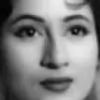This one is an afterthought, and so will be blessedly, if relatively, brief.
There were only 3 significant scenes yesterday, which I will now take up ad seriatim, assuming that you would all have watched the episode.
Jalal-Jodha: The earlier part of this scene was charmingly quasi-domestic, even if Jodha generally looks, whenever she is saying anything to her presumed life partner for the next 6 janams, as if she had a toothache😉.
If, for example, she had smiled even slightly while asking him if he now trusted her not to poison him, think how much more delightful the scene would have been,and this without the least slippage on her side towards affection or caring, only towards mischief!
Jalal's sudden look of trepidation, as he looks back at Jodha after having gobbled up all the kheer, like a little boy caught in mischief, is delightful. It resembles nothing so much as Jodha's Kanha as a makhan chor. 😉
One question here: Why does Jodha not eat the spoonful of kheer that she is still holding in her hand, and fulfill her dadisa's desire that they should eat it together?
Rajvanshiyon ka gungaan: Jalal is so taken up with what he calles the aankhon ki chamak aur painapan in Prithviraj's black and white profile, done in pencil, despite the fact that he can see only one eye and that too not full front, that one suspects part of his gushing is Rajat's own nostalgia for his spectacular debut as the young Prithviraj !
One would have almost assumed, listening to such lavish praise from an emperor who must have been familiar with the best that the Persian miniature school of painting had to offer, that he was admiring an Albrecht Durer (one of the most famous of medieval German artists, specializing in etchings and very fine brush work), whereas it was a pretty ordinary effort by an amateur artist, Suryabhan, its most striking feature being the proudly twirled (half) moustache.
I suppose one should be grateful that Jodha did not provide that choice bit of information at this point!
Jalal is, like Darcy when Elizabeth comes to Pemberley, determined to be pleased with the Rajvanshis, as he knows that is the one sure fire way to please Jodha. So he moves from the sketch to detailed praise of their manifold virtues, carefully avoiding anything the least negative.
His earlier reference to her triple bulleye in archery, which he cites as proof that she would never try to do him in by staging an accident, is plain ridiculous, but I suppose such folly is to be expected in one new to feelings that are alien to him, and which he does not as yet understand.
The apology of an apology: Jodha listens to all of this with a face that shows very little warmth or even appreciation; she seems to take it as no more that the due of her race. She then launches, using his encomium to the unknown warrior in the sketch as a base, into the peroration that ends, unfortunately, in her hoping for more such Rajvanshi shoorveer, "hamein Mughalon se bachane".
In that one sentence, she cuts off not just Jalal, but also Hamida and all the other Mughals who have been incredibly kind and accommodating and affectionate towards her, shuts them into a circle marked ghrina ke patra, and distances herself from them en bloc.
That her comment is made after Jalal had been extra generous in his praise of the Rajvanshis makes it all the more ungracious. Moreover, it reveals what Jodha really feels, as a man might do if he is drunk. That she sees Mughals as a monolithic group deserving nothing but hate, forgetting not just Hamida but the many others in Agra who have been so kind to her. (Jodha should have been in the household of the Maharaja of Bundi, for example, to learn what treatment was often according, to wives and praja alike, by many of her own kind.Not all rulers were like Maharanas Udai Singh and Pratap, and later like Shivaji Maharaj. There were many very dismal specimens among them).
This is what hurts Jalal, and when he says that aapki har ek baat nishane par lagi, that bitterness and the hurt shows plainly.
Any woman with some sensitivity would have begged pardon again and tried to soothe the hurt. Not Jodha, for she is self-righteous to a fault, and can never say sorry from the heart, for she does not feel sorry at all.
Her apology, which is in fact an apology for one, looks and sounds proforma because she does not, as she should have, immediately qualify her faux pas, and at least say that she meant only oppressive Mughals like Sharifuddin, and that she loves his Ammijaan and so many others in his household.
Among us, Jodha is generally indulged beyond all reason by the majority, rather like the way Hamida Banu treats her, and every small decrease in her rudeness to Jalal is treated as if a comet was blazing thru the skies heralding good fortune for all!😉 When this decrease is, soon enough, cancelled by her next bout of rudeness, that is sought to be slurred over. And so on and on.
In this instance, it is not enough to say that she did not mean to hurt Jalal. Everyone is responsible for the effects of his/her actions, whether they are meant or not. That is why the law has a manslaughter charge for those who kill another without meaning to do so. They cannot walk free saying that they did not mean to kill that person.
Jalal, however, is relentlessly pilloried, no matter what he does, and methinks he does far too much bending over for Jodha, which does her no good at all, in fact the reverse. Whence my pious but clearly fruitless hope that Jodha should have become better acquainted with the likes of the Raja of Bundi. It would have taught her to appreciate her current lot in life.
Oh, well, if wishes werer horses!!
The Gifts: I loved Jodha's reminiscing, for once with a half smile when remembering Jalal, about the bedtime story and her looking pleased when Jalal's chotti fauj is visibly gaga over him and his gifts.
In her rushing to publicise her Ammijaan's Rajvanshi connections, and by extension, Jalal's as well, one sees some slight sense of identification with her in laws. Maybe she feels a tad ashamed about what she had blurted out to Jalal a little earlier, and about the residual bitterness in his face even after her apology of an apology.
Perhaps that sense of guilt is also the reason why she wears the green dress the next day, puffing Jalal up no end! 😉
But what is it with all those long Ameri faces on sighting the green joda? Is a good wife not supposed to adjust to the tastes of her husband and her sasural? Why does Mynavati not pull up the stupid Shivani, at least after Hamida & Co have moved on, for saying that Hamida should have remembered that Jodha does not like green?
It was incomprehensible, and then she softsoaps the whole to Jodha, practically pleading with her and saying that gifts from the sasural should be respected. If this is the way she has brought up her daughters, no wonder Jodha is the way she is!
I cannot see any bahu being indulged like this in any 16th century sasural, Rajput or Mughal. If Sukanya pulls any such stunts in her sasural, one can bet that she will get short shrift.
Moreover, I do not remember Jodha objecting to the rich green joda that Hamida had gifted her for the jashn after her marriage, which she then wore without any fuss. Bizarre.
Mahaam's incendiary quid pro quo: Even before she gets to this, Mahaam, by ostentatiously stressing that two other gifts are from the Shahenshah's Begum-e-Khaas Ruqaiya Sultan, and his doosri Begum Salima Sultan, obviously wants to rub it in that Jodha in only No.3 among Jalal's begums.
When she burns the gift from Jodha's dadisa, she is being as ill-mannered and petty as Jodha was when she did the same. Jodha was in fact worse behaved, as she did it in front of all the Mughals.
So Jodha sounds hypocritical, to say the least, when she now talks of Mahaam's soch, for what about her own kaand earlier? What is sauce for the Amer ki Mirchi is surely sauce for the Wazir-e-Aaliya. As Vicki pointed out earlier, what goes around comes around, and Jodha's fishwife like behaviour, totally lacking in royal dignity and self-possession, has now boomeranged on her.
I doubt, however, if she will learn anything from this lesson. If only she had said to Mahaam, with impeccable dignity: Mahaam Angaji, wo toh meri bhool thi. Par aap to mujhse badi hain, aayu mein , jeevan ke anubhav aur gyaan mein. Agar aap bhi meri us samay ki naasamajhi aur nirankush krodh ko dohrayengi, so apke aude ka maan karna nahin hua na?
Pot pourri: Poor Jalal will end up disgorging the prized Ratnapur fort to salvage Sukanya's marriage, but what puzzles me is how Sharifuddin will extricate himself from a charge of either incompetence or, worse, chicanery. He can only do it by insisting that Raja is now blackmailing the Mughal emperor by going back on his word, and is now demanding the fort after not having made any such demand during the negotiations. It will be his word against that of the groom's father, and hopefully they will avoid a conclave that will end in a slanging match.
The chausar face off between Pratap and Jalal should end in a draw. I am sure there is this possibility in chausar, as in chess.
So on to the next animal in the queue, Jalal's oddly named Hawai.
Shyamala B.Cowsik
NB: A historical footnote about Prithviraj Chauhan, for those interested.
There is not the least doubt that in terms of sheer bravery and his dauntless fighting spirit, Prithviraj Chauhan was all that Jodha says in his praise, and then some more. That is he is up there in the pantheon of our national heroes for all times to come.
But one thing that Jodha fails to mention, in her paean to Rajvanshi valour and integrity, is that the chal that trapped him was that of a Rajput, his own father in law, not that of an Afghan.Second, that for all the well merited idolisation of Prithviraj, the fact remains that he lost the second battle of Tarain in 1192 because the other Rajputs would not unite under his banner, any more than they did with Maharana Pratap against Akbar. The fact is that as Maharana Udai Singh is shown lamenting in Maharana Pratap, the Rajputs were chronically disunited and foolishly quarrelsome over trifles, which is why they wasted much energy fighting each other, making it easy for the outsiders to defeat them.
Third, if Prithviraj had not been quixotically generous and let Ghori go free after he defeated him in the First Battle of Tarain in 1191, he would never have been defeated the next year, and all the atrocities that Ghori then inflicted on the whole of North India would never have happened. That was not great generosity on his part, it was irresponsible folly.
Prithviraj should have imprisoned Ghori if he did not want to execute him, and he had no right to take such chances with the safety of his people, protecting whom was his primary rajadharma. His uncalled for generosity to Ghori had terrible consequences for hundreds of thousands of innocents, and his personal sufferings, huge as they were, and his heroic end, cannot compensate for what his people suffered because of his tragic error of judgment





































68